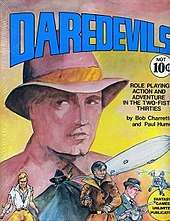Daredevils (role-playing game)
Daredevils is a pulp magazine tabletop role-playing game set in the 1930s designed by Robert Charrette and Paul Hume, and published by Fantasy Games Unlimited in 1982. Daredevils was not popular; in his 2011 book Designers & Dragons, Shannon Appelcline said, "It was probably still too awkward and it was only supported with four supplements."[1]

Description
Daredevils was Charrette and Hume's third game following publication of Bushido and Aftermath! All three games feature similar game mechanics, although those of Daredevils are simpler than those of Aftermath![1]
The game components are:
- a sixty-four page rulebook that describes the characters' abilities, their careers, skills, movements, forms of combat (with an emphasis on firearms) and vehicles. There are chapters which give an overview of life in the 1930s; describe the creation of the game; and list the non-player characters.[2]
- a thirty-two page book entitled Adventures that contains four mini-scenarios.
- a game master's screen.[2]
- a blank character sheet that can be photocopied[3]
- dice[3]
Character generation is a combination of a "point-buy" system and die rolls to generate the six abilities.
Setting
The original game and its four included scenarios are set in a historically accurate Earth of the 1930s and are meant to recall the adventures of pulp magazine characters such as Doc Savage, Sam Spade and The Shadow,[4] as well as detective novels and film noir detective films of the 1930s and 1940s. The player takes the persona of a detective cum pulp fiction hero.[4] Adventures for Daredevils published in following years involve other themes that were popular in 1930s pulp magazines such as lost worlds, exotic locales, and supernatural horror.[5]
Reception
In the February 1983 edition of Dragon (Issue 70), Ken Ralston found the game "does an admirable job in covering rules many of the important features of adventuring in the modern era of technology." But Ralston found reading the rules to be a slog, exacerbated by the lack of an index. "The style is dense and compressed, presumably because of the designer’s anxiety to include every bit of the detailed and clever rules created to handle combat, skills and tasks, character generation, and the trappings of technology." Ralston also found the combat system "particularly bewildering... It slows the rhythm of the game and distracts from the charming atmosphere so painstakingly developed." On the positive side, he found the character generation system to be "detailed but well organized", and the rules about electricity, locks and disease "entertaining and credible." He also found "the suggestions for creating adventures and non-player characters are worth reading by players of any FRP game." Ralston concluded, "Despite my reservations about the readability and complexity of the rules and procedures of Daredevils, it is the most comprehensive set of rules covering role-playing in the modern era, and shows great ingenuity in handling many gaming situations that are handled poorly or not at all by other systems. If the players avoid combat, the game plays smoothly and at a satisfying dramatic pace."[3]
In the March 1983 edition of The Space Gamer (Issue No. 61), John Rankin commented that "Daredevils is a most interesting and satisfying game. Unless you didn't like the Aftermath/Bushido game system, at all, you should find Daredevils a more than adequate RPG to propel you into '30s action and adventure."[6]
In the December 1983 edition of Imagine (Issue 27), Paul Cockburn compared the game favorably to the earlier Gangbusters, and praised the realism of Daredevils in comparison to Call of Cthulhu. Cockburn also compared the game favorably to the adventures of Indiana Jones.[7]
The editors of Different Worlds made similar comments but criticised the rules for being too complex.[8]
In the March 1984 edition of White Dwarf (Issue 51), Marcus Rowland found the character generation system complex, and combat "very complicated, using a lot of modifiers and intricate calculations to establish the result of each shot or blow." He gave the game an above average overall rating of 8 out of 10, saying, "The rules system is slightly top-heavy, and I suspect many referees will simplify or abandon some of the more awkward areas... I'd not recommend the system to beginners, but more experienced referees won't have much trouble using it.[9]
In the pages of his 1987 book, Role-Playing Mastery, Dungeons & Dragons co-creator E. Gary Gygax mentions Daredevils and Bushido in his short list of notable role playing games.[10]
Publications
- Daredevil Adventures Vol. 2 No. 2: The Menace Beneath the Sea
- Daredevil Adventures 3: Supernatural Thrillers Issue
References
- Applecline, Shannon (2011). Designers & Dragons. Mongoose Publishing. p. 75. ISBN 978-1-907702-58-7.
- Schick, Lawrence (1991). Heroic Worlds: A History and Guide to Role-Playing Games. Prometheus Books. ISBN 0-87975-653-5.
- Rolston, Ken (February 1983). "This game's for daredevils only". Dragon. TSR, Inc. (70): 73.
- Rowland M. The Name of the Game. White Dwarf July 1984 issue 55 p13.
- "Daredevils." Fantasy Games Unlimited 2006. Accessed 26 October 2012.
- Rankin, John (March 1983). "Capsule Reviews". The Space Gamer. Steve Jackson Games (61): 35–36.
- Cockburn, Paul (December 1983). "Scenario Reviews". Imagine. TSR Hobbies (UK) Ltd (27): 42.
- Daredevils. Different Worlds March 1983 issue 27 p43. Chaosium.
- Rowland, Marcus (March 1984). "Open Box". White Dwarf. Games Workshop (51): 12–13.
- Gygax, Gary (1987). Role-Playing Mastery. New York: Putnam Publishing.
External links
- Daredevils listing at the RPG.net game index.
- Daredevils page at the Fantasy Games Unlimited website.